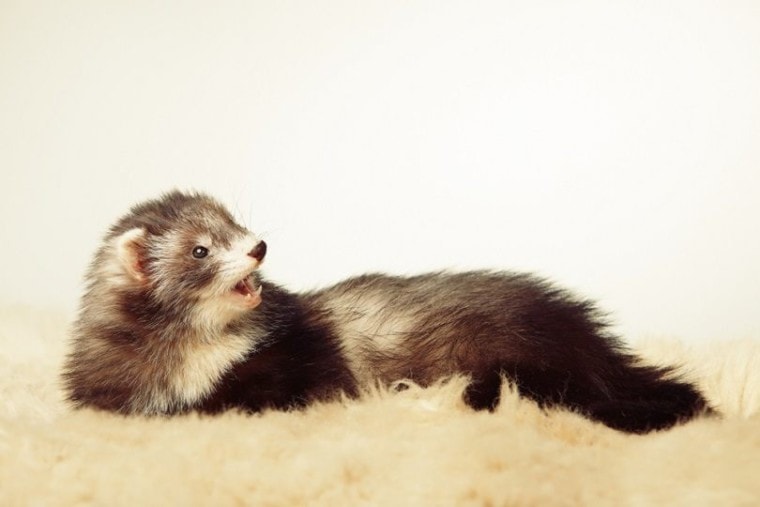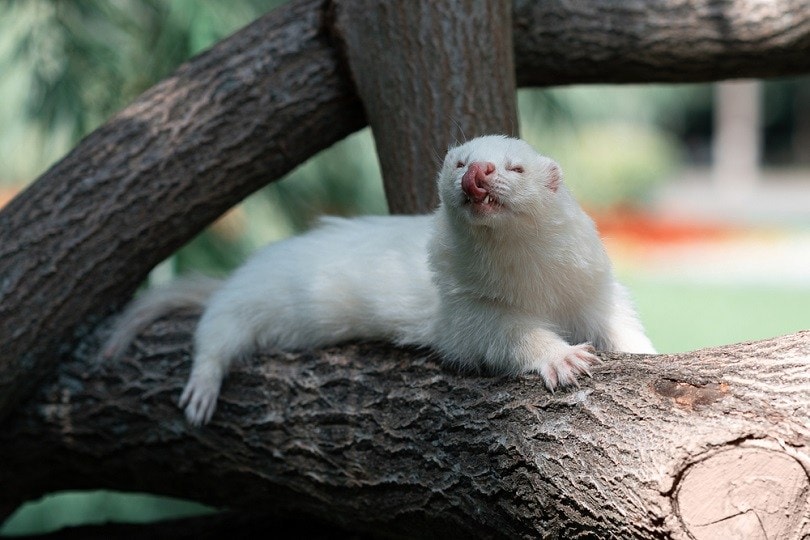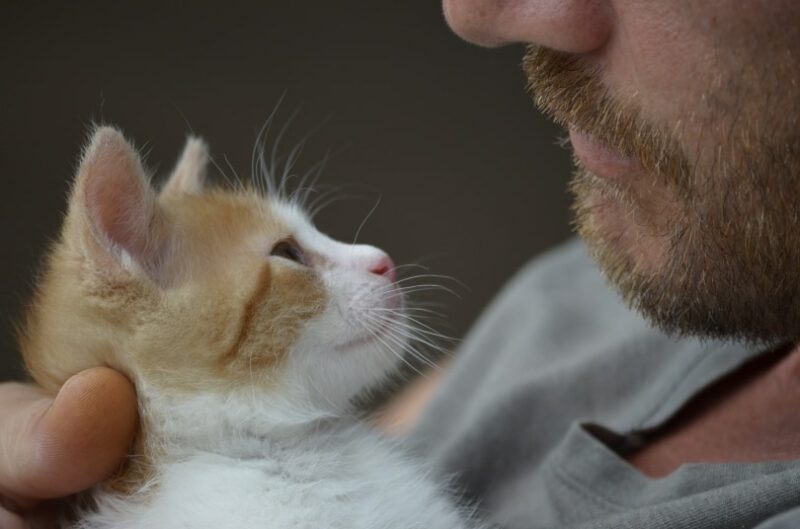
Height:
18-24 inches
Weight:
1.5-4.5 pounds
Lifespan:
5-9 years
Colors:
Albino, black, black sable, champagne, sable, chocolate, cinnamon, white
Suitable for:
Children, families
Temperament:
Playful, intelligent, curious
A Swedish breeder created the Angora ferret mostly by accident when they noticed that many of their ferrets had extra hair on their back legs. He sold his pack of furry ferrets to a fur farm who further developed them into the Angora ferrets available today. They have more hair in the winter than the summer, but it’s always noticeably longer than a standard ferrets coat. However, other than the coat, these ferrets are like any other.
Angora Ferret – Before You Buy…

What’s the Price of Angora Ferrets?
An Angora ferret will usually cost between $65 and $250. The color you choose can significantly increase the cost, and more experienced and reputable breeders will charge more than one who is less experienced. Because Angora ferrets are rare, you may have difficulty finding one in your area, so travel costs may also be an issue. It’s also important to note that ferrets are illegal in California and Hawaii due to concerns about them becoming feral and threatening local wildlife. It may be unlawful in some counties, so it’s best to check with your local authorities before making a purchase.
 3 Little-Known Facts About the Angora Ferret
3 Little-Known Facts About the Angora Ferret
1. Bred for their fur
Ferrets were originally bred for their fur and didn’t become pets until much later.
2. Angora Ferret was a mistake
The Angora Ferret is mostly the product of a fur farm.
3. Make sure not to spay or neuter too early
It takes a full year for their hormones to develop, so spaying or neutering a ferret too early can shorten their lifespan.
Temperament & Intelligence of the Angora Ferret

Ferrets each have a unique personality, much like cats and dogs, and they are very playful with nearly unlimited energy. They are inquisitive and like to explore your home to find hiding spots and toys. You will need to keep a close eye on them because they can quickly go missing, only to reappear several hours later looking for food.
Angora ferrets are extremely intelligent and have good memories. They form strong bonds with their owners and any family members, and they enjoy snuggling and like when you carry them. They are extremely nimble and are great climbers.
Are These Ferrets Good for Families? 👪
Angora ferrets make great family pets. They are extremely outgoing and love attention. It loves to play games and will figure out ways to get attention if they feel like you are ignoring it. Children will enjoy carrying it around, and they are not aggressive and will not bite unless you scare them or pull their hair.
Does This Breed Get Along with Other Pets?
Your Angora ferret should get along great with other ferrets, but we advise against keeping them with dogs, cats, or rodents. Some dog breeds will not bother with the ferret, and they will get along great, while others have a hunting instinct that can quickly become dangerous. Cats will almost certainly hunt them and go to great lengths to stalk and pounce. Like the cat, ferrets are carnivores and will likely hunt and kill and rodents you might have.
Things to Know When Owning an Angora Ferret:

Here is a list of things to consider before purchasing an Angora ferret.
Food & Diet Requirements 🦴
Ferrets are carnivores, so you will need to feed them a diet high in animal proteins and low carbohydrates. The most popular way to feed an Angora ferret is to use high-quality dry cat food with plenty of protein. Chicken and turkey breasts are a great treat to balance out the diet of dry kibble. You can also give them a small number of cat treats.
Exercise 🐕
A ferret does not require going outside for walks the way dogs do, but they will need at least two hours of playtime each day. The best way to provide this activity is to allow them free run of the house to explore and enjoy themselves. You can also throw balls and let them play with cat toys. However, you’ll need to supervise them because their play can become quite aggressive, and they will easily tear up most toys in a single sitting, and they could swallow parts of it.
Training 🎾
Ferrets are intelligent and easy to train to use a litter box, much like a cat. They will also quickly learn their way around your home and recognize your voice and know what certain things mean by your voice’s tone, like when it’s time to play and when playtime is over. You can also train them to become accustomed to certain things, like hair brushing and nail clipping, with patience and practice.

Grooming ✂️
Your Angora ferret will need a moderate amount of maintenance that’s slightly more than a standard ferret.
- Brushing
Ferrets do not shed, but you will still need to brush them often with a soft-bristled comb or brush to help spread their natural oils and remove any tangles or knots. Once a week or so should be more than enough unless you notice a tangle forming.
- Ears
Angora has plenty of nooks and crannies in their ears that can hide all types of dirt and parasites. Fleas love to hide here, which can make the ears sensitive. It’s important to clean the ears at least once a month carefully with a cotton swab. Brown wax is good, but a dark black wax is a sign of a parasite.
- Nails
Angora nails are very long and sharp. They can damage your skin and your furniture, so you will likely want to trim them back. You’ll trim the nails like you would a cat, but it will take some time to get your pet into the habit as they do not like their feet held. A ritual of petting them while holding one paw is the recommended way to get them used to the process.
- Tooth Brushing
Tooth brushing is also vital to help reduce the risk of dental disease. Once again, you will turn to cat products because it’s quite hard to find a ferret toothpaste, but several brands are suitable for cats that will work just fine. We recommend brushing at least once a month for best results.
- Bathing
Ferrets have a distinct smell that will worsen if you don’t bathe them semi-frequently. They are very clean animals and will do most of the work for you, but you will need to perform monthly bathing to keep the odor at bay.
Health and Conditions 🏥
Here is a list of health conditions common to the Angora ferret you should know about before purchasing one.
Male vs Female
Male Angora ferrets tend to be slightly more aggressive than females, and they tend to produce more territory marking. Otherwise, they are very similar in size, weight, and personality.
Final Thoughts
Angora ferrets make great pets and companions. They are fun to watch and play with and are like cats in many ways. Their nails may tear up your furniture and leave you with a scratch or two, but with a little care and maintenance, they will provide you with many years of joy.
We hope you have enjoyed our look into these interesting pets and have found the answers to any question you had. If we have convinced you to give one a try in your home, please share this guide to the Angora ferret on Facebook and Twitter.
Featured Image Credit: Couperfield, Shutterstock


 3 Little-Known Facts About the Angora Ferret
3 Little-Known Facts About the Angora Ferret







